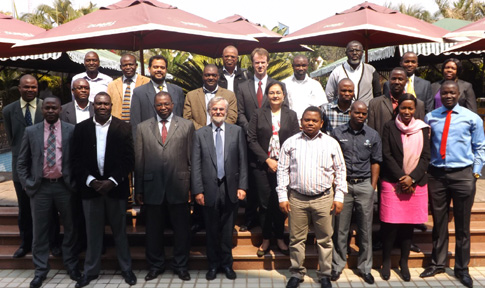NRG-I Meeting
Lusaka (Zambia), August 09, 2013
A timely initiative to assess outcomes of market reforms
Lusaka (Zambia), August 09, 2013
Inaugurating the first meeting of the National Reference Group (NRG) in Zambia Ambassador Albert Muchanga, Director Domestic Trade, Ministry of Commerce, Trade and Industry (MCTI), Government of Zambia expressed his and the Ministry’s support for this Consumer Unity and Trust Society (CUTS) and Zambia Institute for Policy Analysis and Research (ZIPAR) joint-initiative.
He was speaking at a meeting of the CREW project being implemented in Zambia, and three other developing countries. The CREW project is being supported by DFID (UK) and BMZ (Germany), facilitated by GIZ (Germany) and would be implemented till end-2015 to help policymakers and other stakeholders provide greater attention to competition reforms at the national level.

Ambassador Muchanga was pleased that CUTS and ZIPAR have teamed up to undertake a study in two key sectors of the economy – passenger transport and staple food. “Not only are these sectors important for the economy but also form key part of the ‘essential goods and services basket’ of a consumer on a day-to-day basis”, he observed.
Speaking at the event, Professor Frederic Jenny, Chair, OECD Competition Committee opined that competition can be looked at either as an ‘ideal state’ or as a ‘process’. “While competition as an ideal state is theoretical, competition as a process can be better understood and communicated to stakeholders – especially in terms of impact of such processes”, said Jenny.
He added that there are few initiatives that have measured the benefits of competition/market reforms and that too in developing countries. “The CREW Project of CUTS is one such unique project that aims to evaluate the implications of these reforms in the two key sectors with evidence gathered from the ground.
Rijit Sengupta, Regional Director (Africa), CUTS International stated that the project aims to undertake evidence based advocacy and would help in understanding gains from market/competition reforms and use the outcomes for advocacy and generate awareness among various stakeholders to influence policy change that can benefit consumers and producers in developing countries.
Meanwhile, Joseph Simumba, representing ZIPAR, whilst welcoming the members of the National Reference Group (NRG), stated that the CREW project would bring consumers and producers closer to the often abstract issue of competition reforms in the project countries.
The NRG is a multi-stakeholder group of experts and practitioners comprising 15-20 members, constituted in each CREW project country to guide the process of project implementation. The NRG is designed to act as a platform for the project implementers (CUTS partners organisations, in each country) to seek views and feedback from these stakeholders on key aspects of the project. The purpose of the first NRG meeting was to orient the members of the project about the methodology for undertaking the diagnostic research in the two sectors.
representing Indaba Agriculture Policy Research Institute (IAPRI), Munguzwe Hichaambwa, Senior Research Associate, mentioned that there were many policy reforms underway in the agriculture sector but their benefits to small producers of maize in Zambia was debatable. “It is interesting to note that these small producers dominate the sector, and contribute the largest share of the grain to the market. It was necessary toreview policies and programmes both in the inputs and the outputs market. This project was therefore timely and aid in assessing benefits of such reforms, “he added.
Mr. Banda from Commuters Rights Association of Zambia (CRAZ) stated that the buses in Zambia do not carry only passengers. It is the source of travel for small traders as well, who carry their produce from remote locations to the main markets of Lusaka. There are no methods for charging fare for these small traders, and it is often done arbitrarily using crude visual estimation methods.
Robert Mtonga, the sector expert for the passenger transport sector stated that roll back of subsidies in the fuel, have had a huge impact on the bus fare in the country. The prices have been raised by 50 to 100 per cent as a result of this roll-back.
He added by hinting that there was need to draw a line between bus owners and drivers when undertaking the research and gave an example on how bus fares are hiked. He indicated that the bus drivers had influence over bus fare hikes and the process was mostly detrimental to the commuters’ welfare as there was no scientific model for revision of bus fares and the situation was exacerbated by a poor communication structure. “Under the current Road Transport and Safety Authority (RTSA) Act the sector regulator does not play any role in setting prices. This is done through negotiations between the Owners’ Association and the Ministry of Transportation.This has added to the woes of passengers who were already concerned about the safety in these buses”, he added.
Other speakers at the same meeting were Peter Miller, Nathan Associates who provided key inputs to CUTS and ZIPAR on how to deal with various elements of the diagnostic research, which would be the produced early 2014 and form the basis of future interventions in the country.
In his concluding remarks, Simon Ng’ona, Centre Coordinator, CUTS International Lusaka Observed that “assessing benefits of competition reforms which have or not promoted private participation and its impact on the producer and consumer welfare was a contemporary issue which ought to be persued to inform both state and non-state actors’ actions.
For more information, please contact:
Rijit Sengupta, +91 98292 85928 , rsg@cuts.org

What’s New
NOW-I Ghana
October 28, 2015
NOW-I Zambia
October 13, 2015
NOW-I India
October 10, 2015
NOW-I Philippines
September 24, 2015

